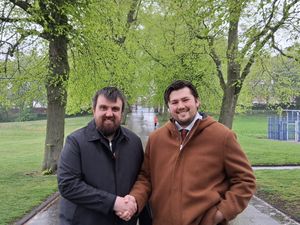'We can't not strike': Doctors, lecturers, and teachers take to pickets in day of action
Buses, vans, and cars honked in solidarity as they drove past picket lines in Wolverhampton on Wednesday, as striking university lecturers were joined by representatives of other unions.
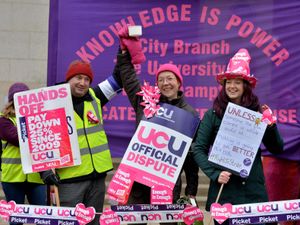
University of Wolverhampton staff gathered outside the Wulfruna building in a protest over pay offers, concerns over workload allocations, and ongoing HR "issues" in concern to "threats" over pay deductions in relation to action short of striking (ASOS).
Strike action occurred over an array of different sectors on Wednesday, including lecturers, teachers, BBC reporters, and junior doctors.
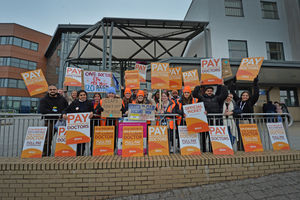
Over at Walsall Manor Hospital, doctors were picketing with signs bearing slogans including "£14/hour is not a fair wage for a junior doctor", "one doctor, £14 an hour, 120 sick patients" and "claps don't pay the bills".
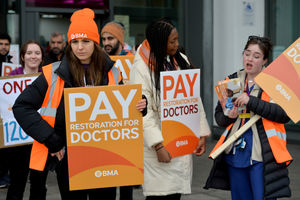
BBC regional news programmes in the Midlands, including Radio WM, were hit because of the strikes. Services including news bulletins on local radio stations and Midlands Today were hit due to the walkout.
Staff are protesting against proposed cuts to the broadcaster’s local radio output.
The National Union of Journalists say the strike is not about pay, but about cuts to local radio and the subsequent job losses.
Teachers across the country also left their classrooms, with Pauline Browne, West Midlands Regional Secretary of the National Education Union, saying: "We do not want to go on strike – we want to be in the classroom, teaching and supporting children and young people.
"It continues to be a regret that our members have to take strike action, but we know that parents and the public understand the gravity of the situation around school funding and teacher recruitment and retention.
"The NEU, as we have always stated, is prepared to enter talks at any point. And, as and when through negotiation a reasonable offer from Government is made we will pause strike action while the offer is put to members.
"This is exactly what happened last week in Wales. Gillian Keegan needs to take a leaf out of the Welsh Government's book, stop playing politics and get down to serious negotiation."
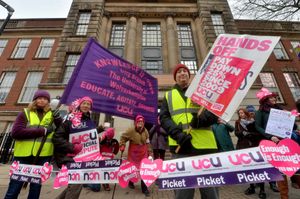
On the Wolverhampton picket line, University and College Union (UCU) members expressed their concerns for university staff nationwide, as well as highlighting their specific worries with the University of Wolverhampton.
It comes after a turbulent year for the university, in which 138 courses were axed due to a £20m deficit and a 10 per cent fall in UCAS applications. It led to the gutting of the university's arts provision which caused an uproar across the university and beyond.
Staff were supported at the pickets on Wednesday by members of the Wolverhampton, Bilston and District Trades Council (WBDTC), including secretary Nick Kelleher, and the Public and Commercial Services Union (PCS), the union for civil servants, all of whom marched with university staff through the town centre.
The UCU Wolverhampton branch secretary Karin Dannehl was the first to the picket line and was decorated with UCU flyers.
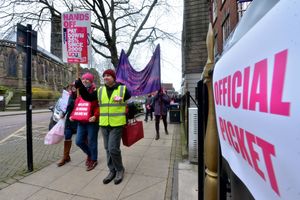
Karin said: "Why are we on strike? Because we can't not strike. That place has so many problems. People are overworking, unsure about their job situation, management is flaking on every level and that's to do with the support structure.
"This Higher Education institution is in particular dire straits, and then there's the national situation. People are just trying to stay alive."
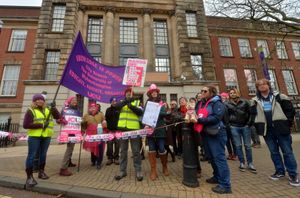
She went on to say: "Workload is a fundamental problem in Higher Education. Workload is not manageable. I get up at 7.30am and at midnight, I'm done with work - I'm not pretending I don't eat, but often my partner will bring food to my desk.
"And I'm privileged, I've got a room to myself, I don't know whether all of my colleagues have that set-up. So workload is a key issue. It's absolutely massive.
"HR documents on workload could be something directly from the 20th century, there's no mention of email or technology or all the training that needs to happen. It's straight from medieval times, straight from a period when none of that was relevant.
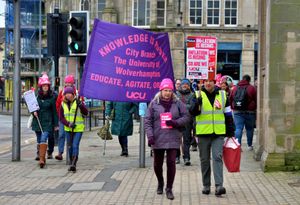
"We cannot physically do more work and it's never enough. Something has to change."
Karin also expressed her concern over a student who collapsed after she was sent a "completely erroneous" invoice for £9,000 by the university's finance system, which was a result of system errors. "She was too distraught to work," Karin said.
Chair of the Wolverhampton's UCU branch, Aidan Byrne, added: "I hate being on strike. I think all my colleagues hate being on strike. But our pay has been cut every year since 2008.
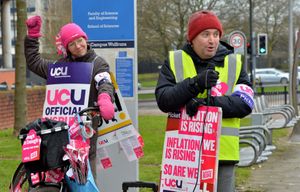
"I'm top scale, I'm 47, I can cope. But I'll need to be replaced at some point and it's getting harder and harder to recruit the new generation into academia. The pay is falling behind and the working profession's got worse and worse every year - there's more work to do and more pressure.
"And contracts have got worse and worse. So many of our colleagues are expected to come into the job, having written multiple books and multiple journal articles, with loads of experience, without ever having had a full-time or permanent job.
"So they come in, tired and exhausted, and then they find that work conditions are not set up to help our students at all. We're expected to do more research and more teaching and more pastoral care with less and less time, and now with decreasing pay year on year.
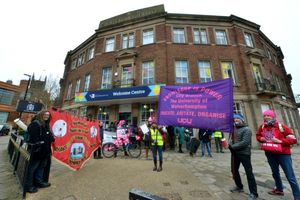
"It's getting really hard to persuade my students to think about a career in academia, even though we need a highly educated workforce. I keep seeing brilliant students who I wish would be the next generation of academics and I can't in all honesty say 'come do this, it's wonderful'. It's not. It's really grim.
He went on to say: "Amongst the members morale is brilliant because we know we're right, and management admit to us that the economic points we're making are right and that terms and conditions have to move on. So we've got the intellectual high ground.
"But we're hitting an impasse because this university in particular is just saying 'we're in financial distress so there's nothing we can do about it'.
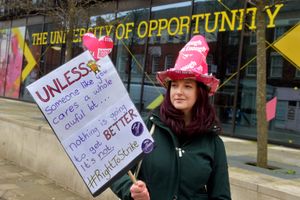
"And they withheld last year's pay rise in secret, they didn't even tell us they were doing it. So that damaged relations really badly and they're going to do it again this year, which means this university will fall two years behind every other university in the country.
"And so people who aren't being made redundant are starting to leave, and this seems to have surprised senior management that people who can get jobs elsewhere are doing so.
"The place is just quite empty - there's the mass redundancies and that's really bad, seeing your friends disappear week by week. I've been to more leaving dos this year than in the last 10 years, but now people have been made redundant and are leaving as well.
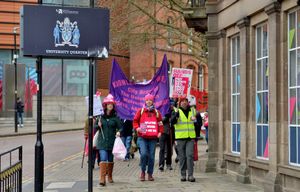
"It just feels like it's hollowed out. It's a sad place to work, and it used to be a wonderful place to work. I've been here 23 years. Now we're all thinking, 'do we really want to stay here'? So it's really sad."
Aidan expressed his gratitude to students supporting the strikes, and said: "The students have helped because they've been absolutely brilliant, they're so supportive. There are some on the picket line today, they've been sending us food and coffee and things. I've had letters and presents from my students, so they're lovely.

"It's partly that a lot of them work, or their parents or partners do, as police officers, civil servants, teachers, bus drivers. One of my students is a part-time bus driver and he's striking, so they're used to the idea of strikes, whereas the previous generation of students weren't necessarily.
"They see us as allies and they aren't impressed by management."

The university staff were joined on the pickets by students Adam Hollins, a health studies student, and Kieran Bott, who studies history. Adam said: "I'm a massive supporter of unions, I work and I'm in a union. I'm not a lecturer, I work in a factory. I'm here to support the staff even though I'm not a member of staff."
However, it wasn't just current members of the university on the picket line. Staff were joined by retired lecturers who wanted to show their support.
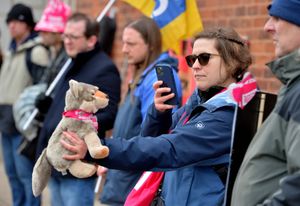
Penny Welsch retired five years ago and taught politics and women' history at the university.
She said: "I'm here today to support my colleagues who are on strike. I'm retired, so I'm not part of the strike, but I think it's really important - this national dispute in terms of recovering pay that people have lost over the last 15 years as well as the pensions issue which involves people in the old universities - the pre-92s.
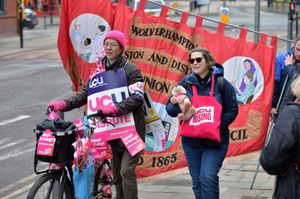
"So it's a really important strike, like all the other public and private sector strikes that are going on at the moment. The workplace today is so pressurised and people are divided up into departments, so on picket lines you really get a sense of community.
"And it's really important to get the message over to people that it's the staff and students who make up the university. It's not the top managers, it's not the governors, it's the people who've got a personal commitment to learning, to research, to providing educational services to as many people as possible.
"I'm totally committed to Wolverhampton. I started here in 1975 and I've been nearly five years retired. And the university plays such an important role in the town. Both in terms of educational provision, in terms of local jobs, in terms of the cultural, political, social and economic life of the region.
"So its centrality should never be underestimated and that's why what happened over the last 12 months with the cuts and the course closures and the redundancies has been absolutely tragic."
Mark Watters, a civil servant and representative of the Public and Commercial Services Union (PCS), also spoke on the picket, telling the crowd: "I'm striking alongside another 130,000 PCS workers today. The main thing I want to point out is that while we're struggling to pay our bills and having to visit food banks, Rishi Sunak has actually asked for the national grid to upgrade just so he can heat his swimming pool.
"That's the difference between the elite and us, here. Most of our staff just about make minimum wage."


